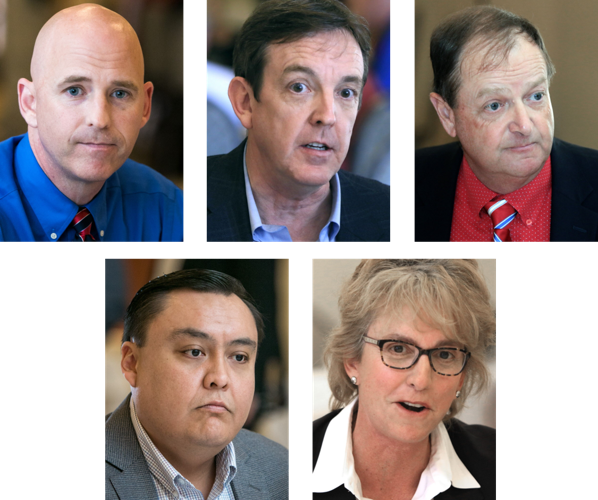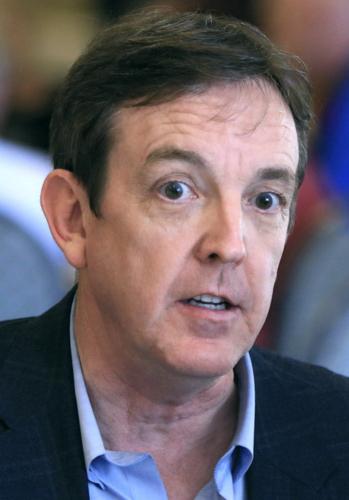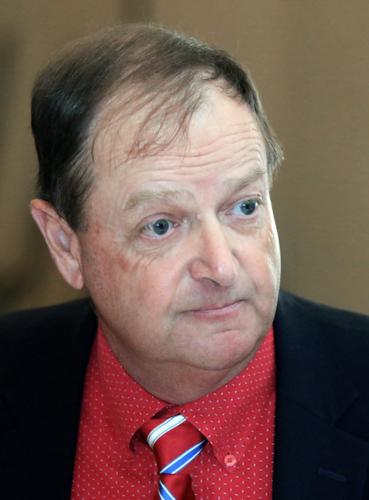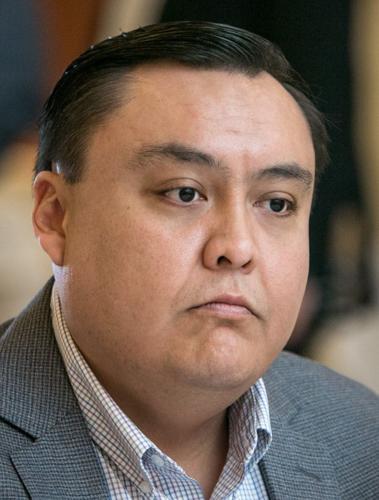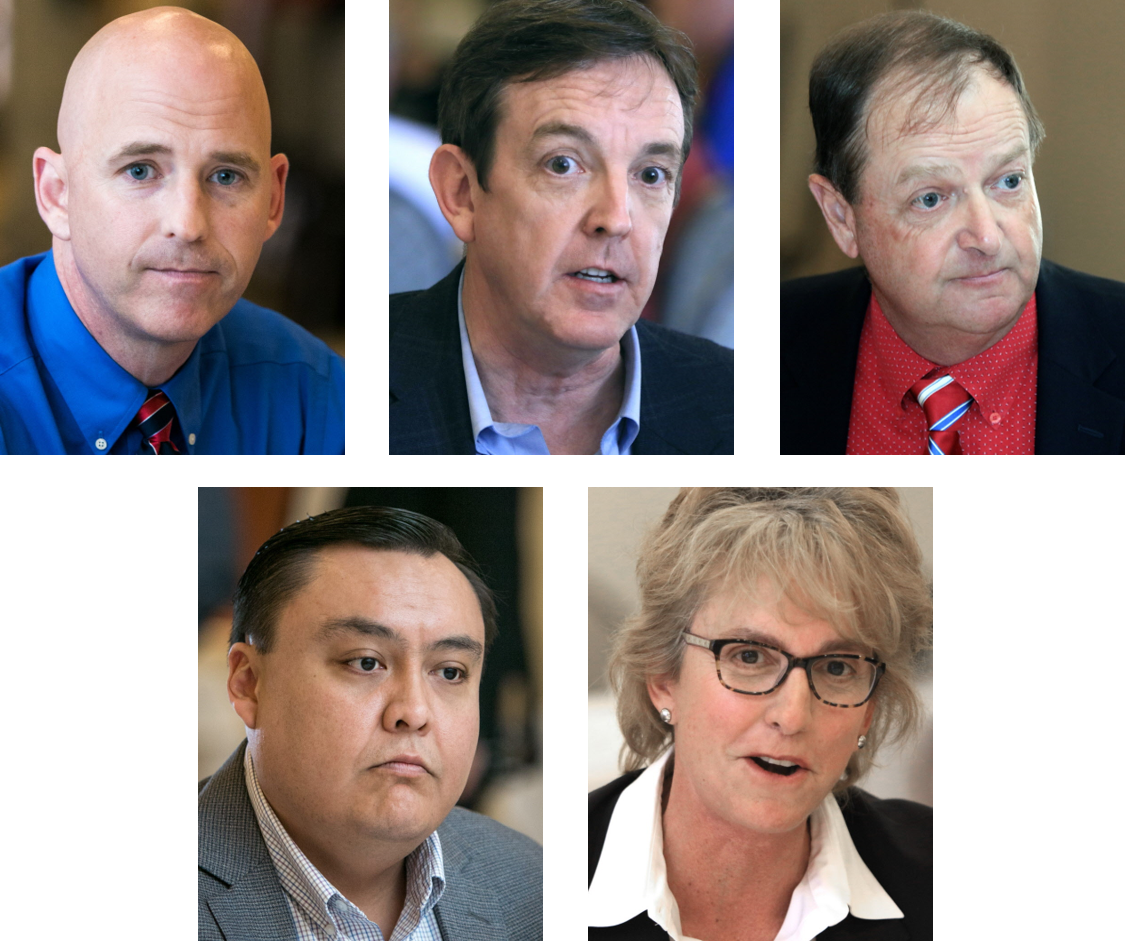Five candidates are in the running for the Republican nomination in Arizona’s Congressional District 1.
The district includes Oro Valley, Marana and parts of 10 other counties in Eastern and Northern Arizona. Incumbent Democrat Ann Kirkpatrick is running for U.S. Senate.
The GOP candidates come from a broad range of backgrounds but most hold similar positions on a range of issues, with Ken Bennett standing out for his more moderate stance on some of them.
Three of the candidates — Gary Kiehne, Wendy Rogers and Paul Babeu — have run for Congress at least once before.
Early voting is underway. Primary election day is Aug. 30.
Meet the candidates
Babeu, the Pinal County sheriff, said it’s his years in the Army National Guard and law enforcement on the U.S.-Mexico border that set him apart. He has been dogged by criticism however, about a home video showing his support for the use of extreme disciplinary methods at a Massachusetts boarding school where he was headmaster and FBI questions about his office’s expenditure of seized criminal money.
Babeu shot back, saying that despite his oversight role, he was not named in any allegations in a state investigation of the school and that such money expenditures always receive higher fiduciary approval.
Bennett, a former state senator and Arizona secretary of state and previously the head of Bennett Oil Co., emphasized his mix of private and public sector experience in making him the best qualified for the job.
Kiehne, a rancher and businessman in the hotel and oil and gas industries, touts the fact that he has never held elected office and wants to put more decision-making power back in the hands of Arizonans.
Keihne did not respond to repeated requests for an interview, so information in this article is from his website or other news coverage.
Shawn Redd, the owner of a laundromat on the Navajo Nation, said he’s the only candidate that has lived and done business both on and off the reservation and “cut his teeth in Navajo politics.”
Wendy Rogers, a retired Air Force lieutenant colonel and owner of a home inspection business, promotes her tough border security stance and focus on better equipping the military, including support of boosting the number of troops sent to foreign conflicts.
On immigration
Rogers was the only candidate to support Donald Trump’s proposal to build a wall, financed by Mexico, across the country’s southern border. She also said she would push for a higher percentage of veterans in Congress because of their decision making abilities.
Babeu, Bennett and Redd called Trump’s wall idea impractical. They also aligned in their disapproval of a special path to citizenship for undocumented immigrants.
Babeu said a double barrier 14-foot corrugated fence in high traffic areas plus cameras, infrared sensors and lighting is what’s needed.
Bennett said he supports a way to bring undocumented immigrants “out of the shadows” and into some sort of legal status that is not an automatic path to citizenship.
“There should be mechanisms for people to get squared with the law,” he said.
“We also need to improve our legal immigration system so it doesn’t take years and years and thousands of dollars to do it the right way,” he said.
As long as the border is secured, Babeu said he also would support creating some sort of permanent status where undocumented immigrants could obtain work permits and receive permanent status.
Government perspectives
All the candidates support reducing government spending, regulation and taxes as the way to spur economic growth and job creation.
Rogers lauded Trump’s economic policy promises, including one to make trade deals that put America first. However, in an interview she wasn’t able to answer whether she supports the Trans Pacific Partnership that Trump loudly opposes.
Kiehne says the key to job growth lies in repealing the Dodd-Frank Wall Street Reform and Consumer Protection Act and lowering the nation’s corporate tax rate.
Bennett said his singular focus is balancing the federal budget, with a plan to cut federal spending by 1 percent, or about $40 billion, and boost the country’s economic growth to 3 percent from 1.2 percent now.
Redd said his goal of trimming the federal budget would include looking at defunding the Environmental Protection Agency. He would also would push for federal spending on a Veterans Affairs hospital and cemetery closer to the Navajo Nation.
On health care
All of the candidates oppose the Affordable Care Act but differed in how they would replace it.
Redd said he believes the states should have their own health-care systems and supported sales of insurance plans across state lines.
Bennett supports increased access to health savings accounts, disconnecting a person’s health insurance from their employment and making sure health-care premiums are completely tax-deductible.
Babeu and Rogers support support Rep. Paul Ryan’s health-care plan, which would eliminate the regulated exchanges in Obamacare, allow the purchase of policies across state lines and change Medicaid and Medicare spending.
Most of the candidates slammed the Department of Veterans Affairs health-care system and Babeu said he would push for overhauling the system entirely. He said he would replace it with small federally run centers that would provide catastrophic care for major injuries, then outsource all other veterans care to private local providers.
On education
Babeu said federal education funding should be transferred to the states in the form of block grants without spending regulations. Kiehne and Babeu oppose Common Core education standards, citing them as examples of federal overreach despite the fact that they were developed by state education chiefs and governors.
Kiehne said he supports vouchers that would allow children to attend private schools on the state’s dime.
On gun control
Redd opposes any expansion of gun regulations.
Bennett said he might consider supporting a limit on gun sales to people on no-fly or terrorism watch lists, depending on how people get on those lists. If convinced, he said he could change his mind on the need for expanded background checks which he currently doesn’t support.
Instead of expanded gun regulations, Babeu said he would advocate for increased government spending on mental health programs.
On the environment
All of the candidates opposed the concept of a Grand Canyon National Monument.
Bennett took less of a hard-line stance, however, saying “we have to be very careful that if we go through the step of declaring a monument need to make sure we’re doing it for the right reasons.” He said he hasn’t yet seen a convincing argument for the need to establish a monument.
Redd opposes the monument and supports the land swap that is allowing for the Resolution Copper mine near Superior despite strong support of the former and opposition to the latter by native groups, calling those tribal members “paid agitators.”
Rogers, Babeu, Kiehne and Redd solidly support the transfer of federal public lands to state hands, stating a need to bring control closer to the local level.
Bennett said he also supports the concept of land transfers but said first there has to be an evaluation of whether the state has the capacity and the wherewithal to manage those lands and can do so better than the federal government.
The candidates all expressed some measure of criticism of the Environmental Protection Agency and its Clean Power Plan, saying the agency is overreaching and that the climate-change mitigation plan will cost jobs and increase electricity rates. Redd denies that human-caused climate change is occurring.
Kiehne supports more oil and natural-gas drilling on federal lands and the outer continental shelf.


